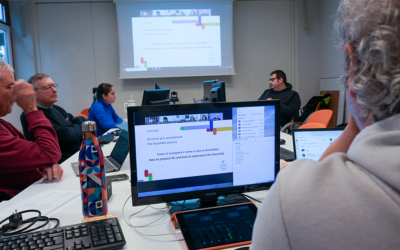 Net-working at the meeting for priests and seminarians in Loppiano, Fr. Justin Nary, 42, from the Central African Republic, spoke in subdued tones about his country which was in the news headlines more than a year ago, following the bloody civil war between Muslims, Christians and Animists. It is a conflict almost forgotten and no longer gathers so much attention, but which continues up to today, triggering serious consequences in the daily lives of the population. “For over three years, I was a parish priest in a big city which was living in the fear of an imminent ethnic-religious conflict, like other cities in the whole country. When it all started, I realised with pain that even among ourselves, we priests, pastors and imams did not even know one another. I felt I had to do something because the lives of our people were at stake». This was how Fr. Justin involved the religious leaders of the other faiths, and held regular meetings where they could share their experiences and together find a way to guide the faithful towards a peaceful lifestyle. The coup d’etat by a minority Muslim group quickly made the situation plunge and the massacres of the non-Muslim population began. But this was not all: a faction of rebels composed of Christians, atheists and military men belonging to the local traditions again overturned the situation, took power and implemented a fierce revenge towards the Muslims. Those who could, left the city, but about 2,000 Muslims ran to take refuge in the parish and Fr. Justin opened the doors to them. After a short time, the rebels who had learned of this went to the parish to kill everyone, if Fr. Justin were to oppose their ultimatum.
Net-working at the meeting for priests and seminarians in Loppiano, Fr. Justin Nary, 42, from the Central African Republic, spoke in subdued tones about his country which was in the news headlines more than a year ago, following the bloody civil war between Muslims, Christians and Animists. It is a conflict almost forgotten and no longer gathers so much attention, but which continues up to today, triggering serious consequences in the daily lives of the population. “For over three years, I was a parish priest in a big city which was living in the fear of an imminent ethnic-religious conflict, like other cities in the whole country. When it all started, I realised with pain that even among ourselves, we priests, pastors and imams did not even know one another. I felt I had to do something because the lives of our people were at stake». This was how Fr. Justin involved the religious leaders of the other faiths, and held regular meetings where they could share their experiences and together find a way to guide the faithful towards a peaceful lifestyle. The coup d’etat by a minority Muslim group quickly made the situation plunge and the massacres of the non-Muslim population began. But this was not all: a faction of rebels composed of Christians, atheists and military men belonging to the local traditions again overturned the situation, took power and implemented a fierce revenge towards the Muslims. Those who could, left the city, but about 2,000 Muslims ran to take refuge in the parish and Fr. Justin opened the doors to them. After a short time, the rebels who had learned of this went to the parish to kill everyone, if Fr. Justin were to oppose their ultimatum.  Fr. Justin continued: “I had done all that was possible to try to seek for help from the army, the authorities, but in vain. And while I was saying Mass, I understood that God was asking me to give Him the most precious thing I had, my own life. I then decided to remain with my Muslim and non-Muslim people, up to the end, conscious that I was running the risk of being massacred. Seeing my determination, also my priest-brothers who had come to take me away, decided to do the very same thing.” Just a few hours before the expiry of the ultimatum, Fr. Justin’s cell phone suddenly rang: it was the chief of the African Union Army who was ensuring him of his help by sending the army which arrived exactly 17 minutes before the rebels, and thus saved everybody’s lives. “After a failed raid attempt, most of the refugees managed to emigrate to the Cameroon – Fr. Justin concluded – while about 800 of them still remained in the parish. What gave me the strength in difficult moments was to ask myself what the friend of the Focolare and Chiara Lubich would have done in my place. I remembered the meetings with the Muslim friends, how much she loved them, and it was immediately clear: she would have given her life for them.”
Fr. Justin continued: “I had done all that was possible to try to seek for help from the army, the authorities, but in vain. And while I was saying Mass, I understood that God was asking me to give Him the most precious thing I had, my own life. I then decided to remain with my Muslim and non-Muslim people, up to the end, conscious that I was running the risk of being massacred. Seeing my determination, also my priest-brothers who had come to take me away, decided to do the very same thing.” Just a few hours before the expiry of the ultimatum, Fr. Justin’s cell phone suddenly rang: it was the chief of the African Union Army who was ensuring him of his help by sending the army which arrived exactly 17 minutes before the rebels, and thus saved everybody’s lives. “After a failed raid attempt, most of the refugees managed to emigrate to the Cameroon – Fr. Justin concluded – while about 800 of them still remained in the parish. What gave me the strength in difficult moments was to ask myself what the friend of the Focolare and Chiara Lubich would have done in my place. I remembered the meetings with the Muslim friends, how much she loved them, and it was immediately clear: she would have given her life for them.”
Be a light in the darkness
Be a light in the darkness




0 Comments